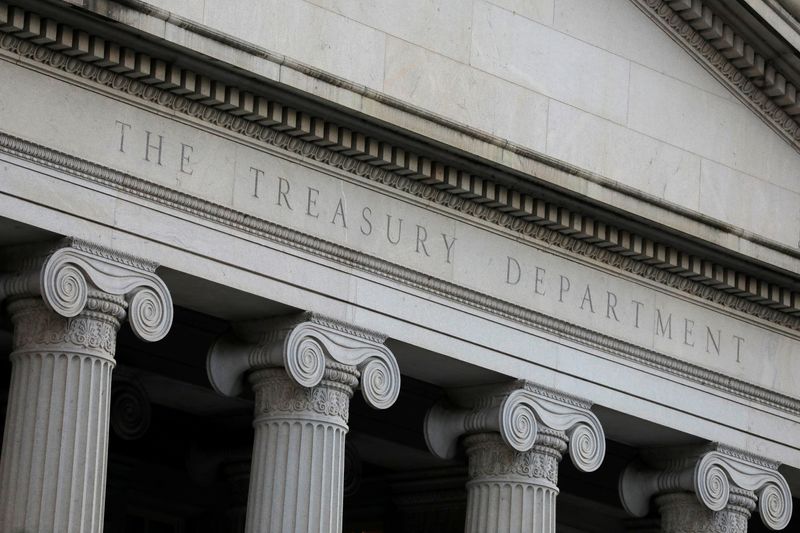By Saqib Iqbal Ahmed
NEW YORK (Reuters) -A selloff in U.S. government bonds is jolting everything from stocks to the real estate market, as investors recalibrate their portfolios amid a surge in Treasury yields to their highest levels in more than a decade and a half.
Yields on the benchmark 10-year US Treasury, which move inversely to prices, stand near levels last seen in 2007 following a selloff fueled by a hawkish outlook from the Federal Reserve and mounting fiscal concerns. Treasuries are on track to post their third straight annual loss, an event without precedence in U.S. history, according to Bank of America Global Research.
Because the $25-trillion Treasury market is considered the bedrock of the global financial system, soaring yields on U.S. government bonds have had wide-ranging effects. The S&P 500 is down about 8% from its highs of the year, as the promise of guaranteed yields on U.S. government debt draws investors away from equities. Mortgage rates, meanwhile, stand at more than 20-year highs, weighing on real estate prices.
Here's a look at some of the ways rising yields have reverberated throughout markets.
Higher Treasury yields can curb investors' appetite for stocks and other risky assets by tightening financial conditions as they raise the cost of credit for companies and individuals.
With some Treasury maturities offering far above 5% to investors holding the bonds to term, rising yields have also dulled the allure of equities. High-dividend paying stocks in sectors such as utilities and real estate have been among the worst hit, as investors gravitate toward government debt.
Shares of tech and growth companies, whose future profits are discounted more sharply against higher yields, have also suffered.
Another upshot of the surge in yields has been a rebound in the dollar, which has advanced an average of about 7% against its G10 peers since the rise in Treasury yields accelerated in mid-July. The dollar index, which measures the buck’s strength against six major currencies, stands near 10-month highs.
A stronger dollar helps tighten financial conditions and can hurt the balance sheets of U.S. exporters and multinationals. Globally, it complicates the efforts of central banks to tamp down inflation by pushing down other currencies.
Traders have been on watch for weeks for a possible intervention by Japanese officials to combat a sustained depreciation in the yen, which is down 12% against the dollar this year.
The interest rate on the 30-year fixed-rate mortgage - the most popular U.S. home loan - has shot to the highest since 2000.
That's hurt homebuilder confidence and pressured mortgage applications.
In an otherwise resilient economy featuring a strong job market and robust consumer spending, the housing market has stood out as the sector most afflicted by the Fed's aggressive actions to cool demand and undercut inflation.
With Treasury yields surging, credit market spreads have widened as investors demand a higher yield on riskier assets, such as corporate bonds.
Spreads charged on corporate bonds as a premium over Treasuries or credit spreads had calmed down after blowing out during the collapse of Silicon Valley Bank (SVB) and New York's Signature Bank (OTC:SBNY) in March.
The latest rise in yields, however, has caused credit spreads to widen again, adding to funding costs for prospective borrowers.
With little clarity on the trajectory of interest rates and U.S. fiscal problems brewing, few expect the volatility in bonds to subside anytime soon.
The Fed has signaled it will keep rates elevated through 2024, though investors see cuts as early as June 2024.

Anticipation of a surge in U.S. government deficit spending and debt issuance to cover those expenditures has also unnerved investors.
The MOVE index, a measure of expected volatility in U.S. Treasuries, has surged to a 4-month high, signaling expectations for continued Treasury market ructions.